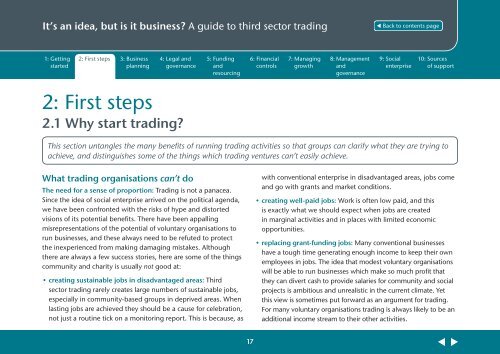A guide to third sector trading - WCVA
A guide to third sector trading - WCVA
A guide to third sector trading - WCVA
Create successful ePaper yourself
Turn your PDF publications into a flip-book with our unique Google optimized e-Paper software.
It’s an idea, but is it business? A <strong>guide</strong> <strong>to</strong> <strong>third</strong> sec<strong>to</strong>r <strong>trading</strong><br />
1: Getting<br />
started<br />
2: First steps 3: Business<br />
planning<br />
4: Legal and<br />
governance<br />
5: Funding<br />
and<br />
resourcing<br />
6: Financial<br />
controls<br />
7: Managing<br />
growth<br />
8: Management<br />
and<br />
governance<br />
9: Social<br />
enterprise<br />
10: Sources<br />
of support<br />
2: First steps<br />
2.1 Why start <strong>trading</strong>?<br />
This section untangles the many benefits of running <strong>trading</strong> activities so that groups can clarify what they are trying <strong>to</strong><br />
achieve, and distinguishes some of the things which <strong>trading</strong> ventures can’t easily achieve.<br />
What <strong>trading</strong> organisations can’t do<br />
The need for a sense of proportion: Trading is not a panacea.<br />
Since the idea of social enterprise arrived on the political agenda,<br />
we have been confronted with the risks of hype and dis<strong>to</strong>rted<br />
visions of its potential benefits. There have been appalling<br />
misrepresentations of the potential of voluntary organisations <strong>to</strong><br />
run businesses, and these always need <strong>to</strong> be refuted <strong>to</strong> protect<br />
the inexperienced from making damaging mistakes. Although<br />
there are always a few success s<strong>to</strong>ries, here are some of the things<br />
community and charity is usually not good at:<br />
• creating sustainable jobs in disadvantaged areas: Third<br />
sec<strong>to</strong>r <strong>trading</strong> rarely creates large numbers of sustainable jobs,<br />
especially in community-based groups in deprived areas. When<br />
lasting jobs are achieved they should be a cause for celebration,<br />
not just a routine tick on a moni<strong>to</strong>ring report. This is because, as<br />
with conventional enterprise in disadvantaged areas, jobs come<br />
and go with grants and market conditions.<br />
• creating well-paid jobs: Work is often low paid, and this<br />
is exactly what we should expect when jobs are created<br />
in marginal activities and in places with limited economic<br />
opportunities.<br />
• replacing grant-funding jobs: Many conventional businesses<br />
have a <strong>to</strong>ugh time generating enough income <strong>to</strong> keep their own<br />
employees in jobs. The idea that modest voluntary organisations<br />
will be able <strong>to</strong> run businesses which make so much profit that<br />
they can divert cash <strong>to</strong> provide salaries for community and social<br />
projects is ambitious and unrealistic in the current climate. Yet<br />
this view is sometimes put forward as an argument for <strong>trading</strong>.<br />
For many voluntary organisations <strong>trading</strong> is always likely <strong>to</strong> be an<br />
additional income stream <strong>to</strong> their other activities.<br />
17












